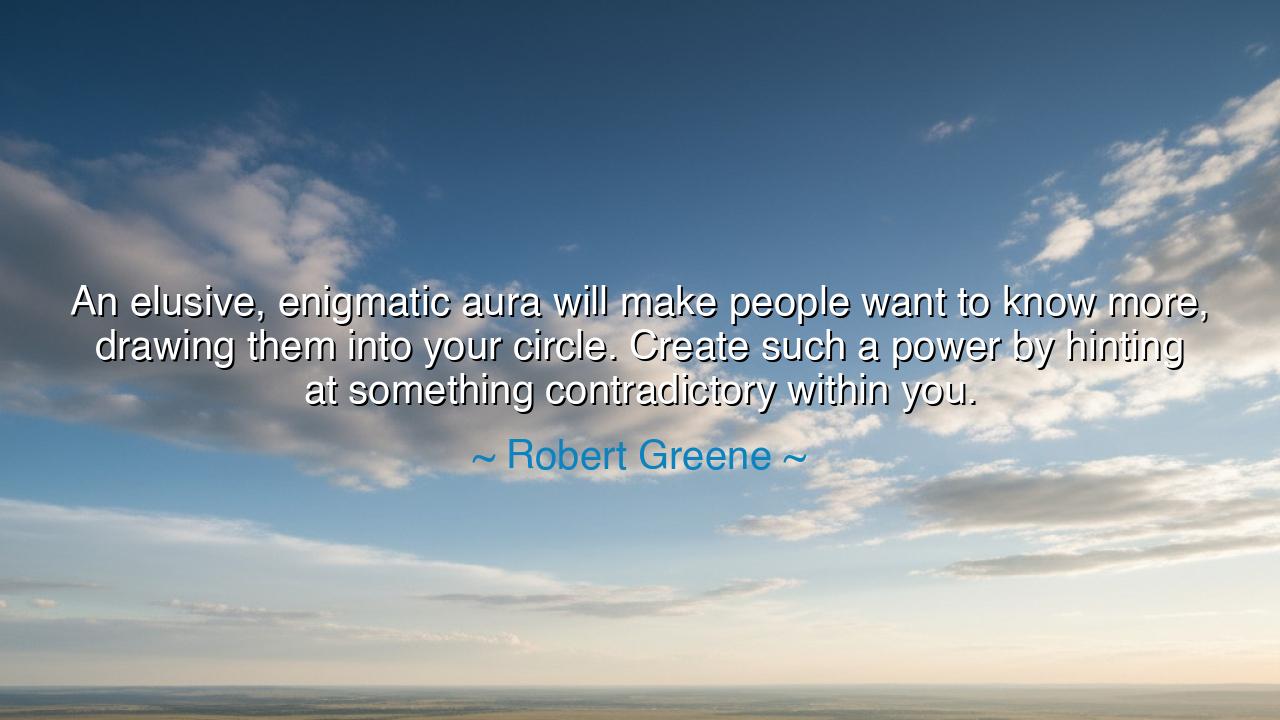
An elusive, enigmatic aura will make people want to know more
An elusive, enigmatic aura will make people want to know more, drawing them into your circle. Create such a power by hinting at something contradictory within you.






The words of Robert Greene—“An elusive, enigmatic aura will make people want to know more, drawing them into your circle. Create such a power by hinting at something contradictory within you.”—are a revelation of the subtle art of influence. They teach that power is not always seized through force or command, but often through mystery, through the quiet magnetism of the unknown. For what is hidden compels the mind more fiercely than what is laid bare, and the suggestion of contradiction awakens endless curiosity.
This utterance speaks of the alchemy of presence. When one reveals too much, one becomes predictable, and predictability breeds indifference. But when one reveals only fragments, cloaked in paradox, the imagination of others fills the gaps, weaving myths greater than any truth. In this way, the individual becomes larger than life, a figure of fascination. Greene teaches that to wield such an enigmatic aura is to command attention without demanding it, to rule hearts without speaking a word.
History offers us the tale of Cleopatra, queen of Egypt. She was at once regal and playful, learned and seductive, merciful and ruthless. These contradictions created a mystery around her that ensnared the greatest men of Rome, Julius Caesar and Mark Antony, bending them to her will. It was not beauty alone that granted her influence, but the enigmatic contradictions she embodied, which stirred desire and awe alike.
The quote also reminds us that mystery is a form of control. When others cannot fully define you, they cannot fully resist you. They are drawn closer, compelled to uncover the truth, yet every new layer only deepens the riddle. In this way, the enigmatic spirit gains a kind of dominion—not through chains or commands, but through the irresistible pull of fascination.
Let this wisdom be passed to the generations: guard your depths, reveal only what strengthens your presence, and cloak yourself in just enough mystery that the world leans closer to listen. For the most dangerous power is not the sword or the throne, but the magnetism of the unknown. As Robert Greene teaches, to embody contradiction is to awaken endless curiosity—and in curiosity lies influence that endures longer than fear.






KANguyen Khanh An
This quote makes me think about the fine line between mystery and inauthenticity. There’s no doubt that an enigmatic presence can be powerful—it keeps others guessing and invested. But I wonder how sustainable that approach really is. If you’re always hinting at contradictions to appear interesting, do you risk losing genuine connection? Or perhaps Greene is right that power, by nature, thrives more on intrigue than intimacy.
NTNgoctram Tranthi
What stands out to me here is the idea that contradiction attracts. We’re intrigued by people who can be gentle yet firm, confident yet humble. Greene frames this as a strategy, but I think it also reflects genuine humanity—we’re all walking contradictions. Maybe the ‘aura’ he describes isn’t about manipulation but about embracing the complexity within ourselves and allowing others to sense it without explanation.
NLdong ngoc lam
This statement hits at something fundamental about human curiosity—we’re drawn to complexity. Greene seems to imply that people who reveal both light and shadow, strength and vulnerability, become magnetic. It makes me reflect on how social media culture has almost destroyed that sense of enigma. If mystery creates power, are we losing influence by being too transparent in the age of constant exposure?
L1Toan Ngoc linh 10a1
I find this idea intriguing but also a bit unsettling. The notion of deliberately crafting an aura to influence others sounds powerful, yet slightly manipulative. Greene’s perspective fits perfectly with his broader philosophy on power dynamics, but it raises ethical questions. Should charisma come from self-awareness or strategic concealment? Maybe the best kind of mystery isn’t something you manufacture—it’s what naturally emerges when you don’t overshare everything.
TXDoan Thi Thanh Xuan
This quote really fascinates me because it captures the psychology of mystery in human attraction. Robert Greene seems to suggest that contradictions make people compelling—that being slightly unpredictable draws others in. It makes me wonder, though, is cultivating mystery a form of authenticity or manipulation? Can you genuinely be enigmatic without crossing into artifice, or is the very act of ‘creating’ mystery inherently performative?